When nobody reads Habr
A long time ago, my hypothesis was born: “All IT people, like me, read news and articles at work over a cup of tea and coffee at the very beginning of the day and somewhere after lunch.”
To test this hypothesis (well, not only for this, of course) last year Habra wrote and published a monitor called Pulse Habra . Since the hypotheses need to be checked, I started to collect data and analyze the patterns of behavior of Habra residents.

')
Today I decided to share the main observations.
The structure of the article:
The pattern every week is the same, working days look about the same, and on weekends a sharp drop until Monday.
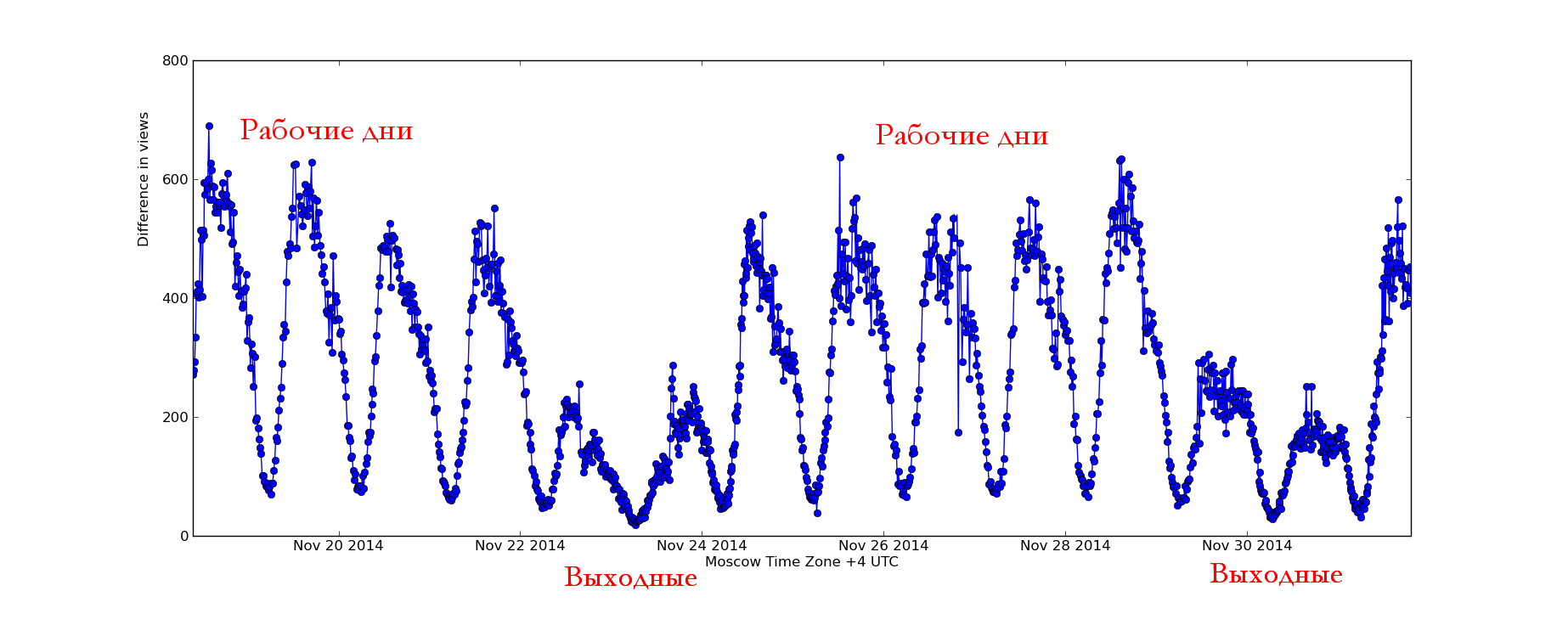
(removed one point due to technical lags)
Important : working days are virtually indistinguishable, on weekends readers are 3-4 times less than usual.
For freelancers, working hours can also be tied to Moscow, so their work cycles and Habr's reading coincide with Moscow ones.
On holidays there is a fall similar to the fall at the weekend. Sometimes the effect is even stronger than on regular weekends:
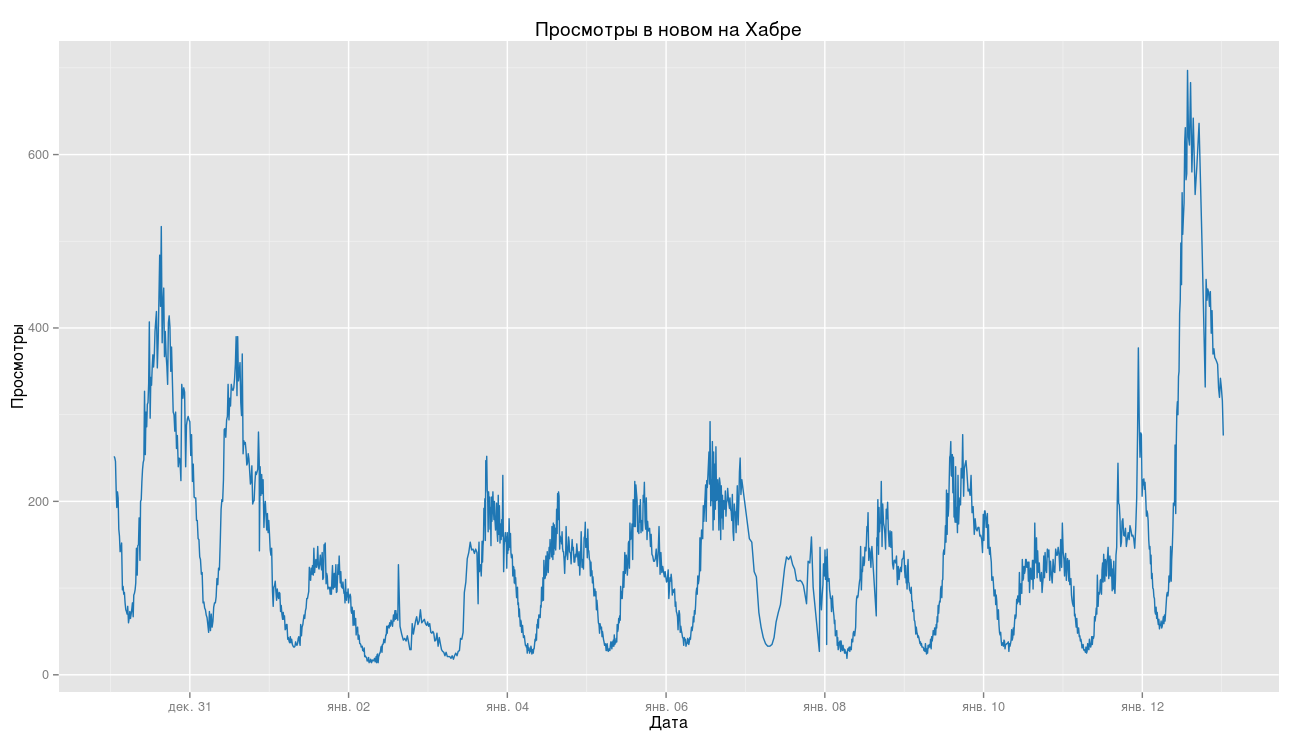
As we see, the number of readers in the New Year's holidays is 4-5 times less than ordinary working days.
Also, the number of articles drops (and views, and rating, and favorites)
This is what the daily top night of the 10th of January looks like:
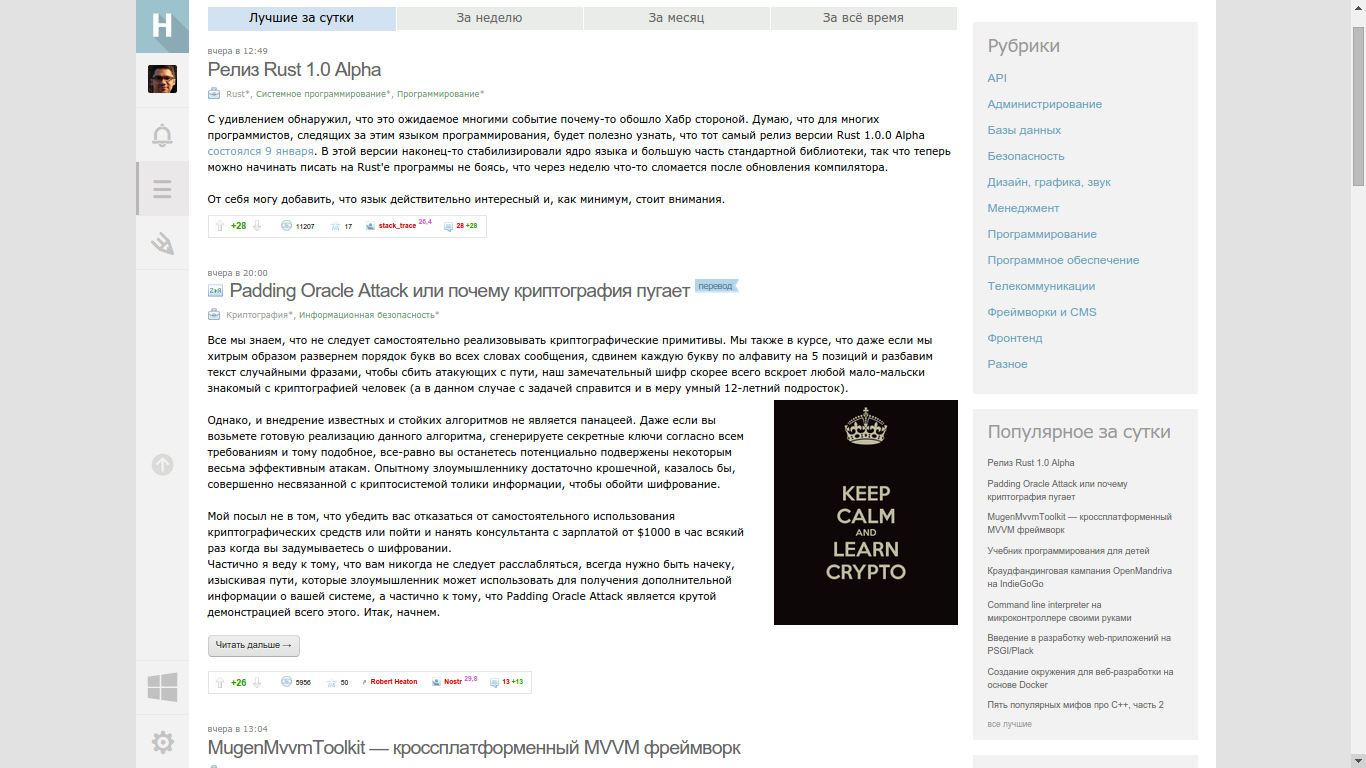
And the bottom of the best for the day:
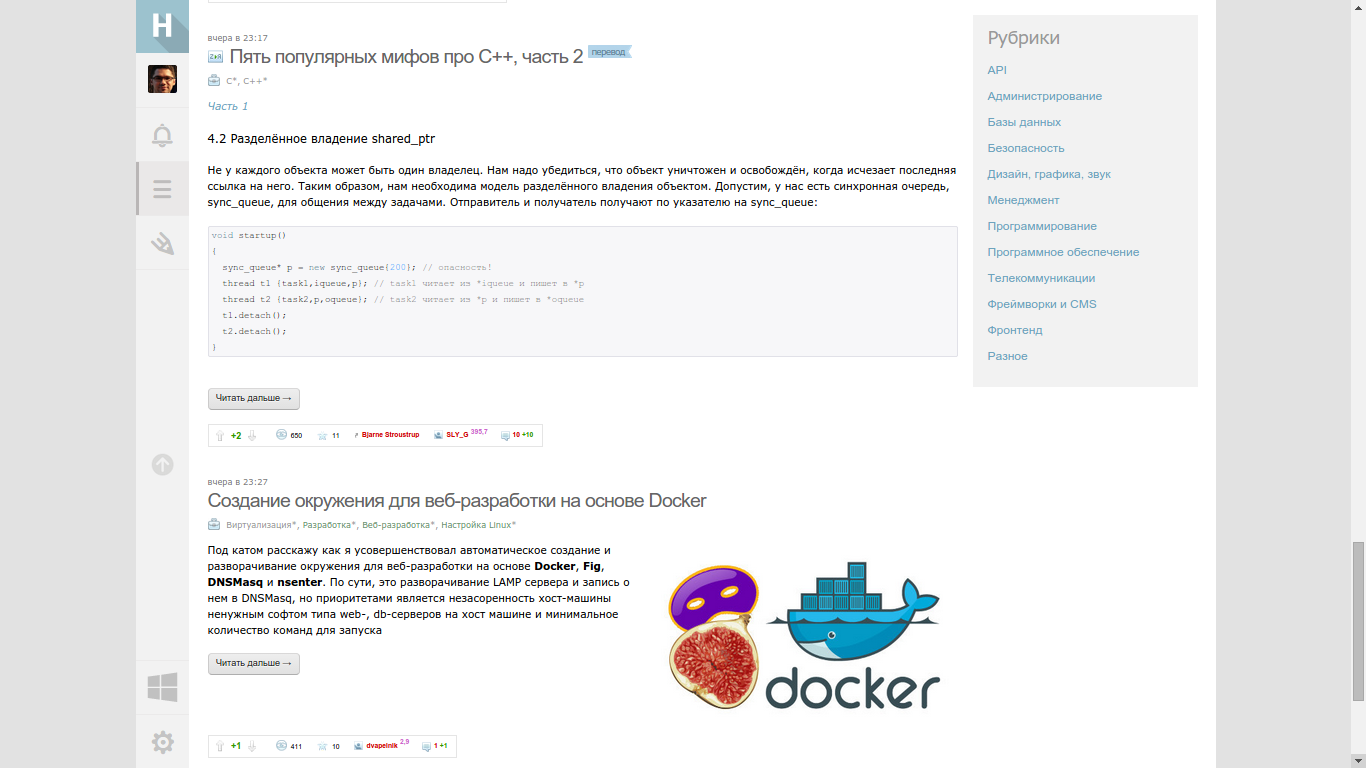
Long holidays often coincide with travel / travel and other entertainment and relaxation procedures, so they affect both the number of articles and the number of readers.
Important : On holidays, Habr is read inactively and in fact no one writes anything, up to 2-3 articles in the daily top; for comparison: on Monday evening in the top 45 articles. Weekend holidays are as deserted as all other public holidays.
First, writing and reading articles are two completely different processes. Writing articles is a long process that requires effort and time, so often we see a surge of articles on Monday and / or steadily emerging articles at night or early in the morning. People invest a sufficient uninterrupted period of free time in writing an article and at the end of this segment lay out the material. It is logical that many people write on weekends or finish writing at night, since it is during this time that a sufficiently long continuous period of time is available for most to work on an article.
Secondly, Habr's reading is an entertaining-cognitive process, so it is quite logical that the peaks coincide with the time of work breaks, or relaxation before the start of the working day over a cup of morning coffee.
Important : the number of readers throughout Habra is weakly correlated with the number of articles (and, with rare exceptions, with the quality of a separate article), because they are based on fundamentally different processes.
Many authors have a good idea of the factors influencing the audience, so we can expect a peak of articles on the completion of holidays and the return of both categories to their normal rhythm of life.
In a post about winter changes on Habré, I asked a question about how the audience changed after the division into Habr and Geektimes and even received the answer:

And, as is known, they have been waiting for the promise for three years (that is, in two years, I will still get access to the Habr API). Instead, I offer my assessment of the change to the Habr audience.
Consider the schedule for the month of July:
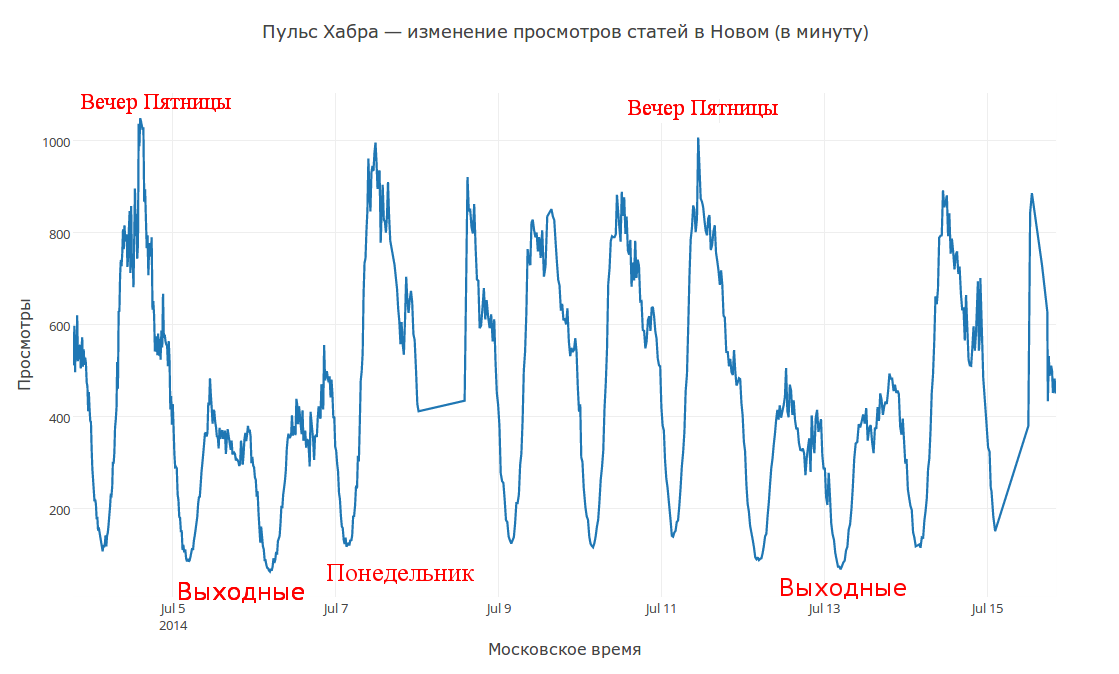
(the schedule from habr-article Syndrome of a step and a cut of attendance of Habr )
Comparing with the data for November (the division was in the middle of October), we will see that the fall is at the level of 25-30% . It would be interesting to look at the official data and see how the audience has changed, but unfortunately, they are not available now.
To get a more accurate picture of what is happening, I decided to add a survey to find out exactly when the majority read Habr and often on weekends. This is necessary because the collected data may not accurately reflect the real picture of what is happening, if a sufficient number of people reread old articles from their favorites, for example, on weekends, the Habr Pulse will miss these views.
If you want your article to read as many people as possible, then:
- We continue to observe
To test this hypothesis (well, not only for this, of course) last year Habra wrote and published a monitor called Pulse Habra . Since the hypotheses need to be checked, I started to collect data and analyze the patterns of behavior of Habra residents.

')
Today I decided to share the main observations.
The structure of the article:
- Weekly peaks of activity and inactivity
- Seasonal effects - New Year's holidays
- Fundamental factors affecting behavior
- Drop in the number of readers from sharing Habr
- Survey: when do you read Habr?
- findings
Weekly peaks of activity and inactivity
The pattern every week is the same, working days look about the same, and on weekends a sharp drop until Monday.

(removed one point due to technical lags)
Important : working days are virtually indistinguishable, on weekends readers are 3-4 times less than usual.
For freelancers, working hours can also be tied to Moscow, so their work cycles and Habr's reading coincide with Moscow ones.
Seasonal effects - New Year's holidays
On holidays there is a fall similar to the fall at the weekend. Sometimes the effect is even stronger than on regular weekends:

As we see, the number of readers in the New Year's holidays is 4-5 times less than ordinary working days.
Also, the number of articles drops (and views, and rating, and favorites)
This is what the daily top night of the 10th of January looks like:

And the bottom of the best for the day:

Long holidays often coincide with travel / travel and other entertainment and relaxation procedures, so they affect both the number of articles and the number of readers.
Important : On holidays, Habr is read inactively and in fact no one writes anything, up to 2-3 articles in the daily top; for comparison: on Monday evening in the top 45 articles. Weekend holidays are as deserted as all other public holidays.
Fundamental factors affecting behavior
First, writing and reading articles are two completely different processes. Writing articles is a long process that requires effort and time, so often we see a surge of articles on Monday and / or steadily emerging articles at night or early in the morning. People invest a sufficient uninterrupted period of free time in writing an article and at the end of this segment lay out the material. It is logical that many people write on weekends or finish writing at night, since it is during this time that a sufficiently long continuous period of time is available for most to work on an article.
Secondly, Habr's reading is an entertaining-cognitive process, so it is quite logical that the peaks coincide with the time of work breaks, or relaxation before the start of the working day over a cup of morning coffee.
Important : the number of readers throughout Habra is weakly correlated with the number of articles (and, with rare exceptions, with the quality of a separate article), because they are based on fundamentally different processes.
Many authors have a good idea of the factors influencing the audience, so we can expect a peak of articles on the completion of holidays and the return of both categories to their normal rhythm of life.
Drop in the number of readers from sharing Habr
In a post about winter changes on Habré, I asked a question about how the audience changed after the division into Habr and Geektimes and even received the answer:

And, as is known, they have been waiting for the promise for three years (that is, in two years, I will still get access to the Habr API). Instead, I offer my assessment of the change to the Habr audience.
Consider the schedule for the month of July:

(the schedule from habr-article Syndrome of a step and a cut of attendance of Habr )
Comparing with the data for November (the division was in the middle of October), we will see that the fall is at the level of 25-30% . It would be interesting to look at the official data and see how the audience has changed, but unfortunately, they are not available now.
Survey: when do you read Habr?
To get a more accurate picture of what is happening, I decided to add a survey to find out exactly when the majority read Habr and often on weekends. This is necessary because the collected data may not accurately reflect the real picture of what is happening, if a sufficient number of people reread old articles from their favorites, for example, on weekends, the Habr Pulse will miss these views.
findings
If you want your article to read as many people as possible, then:
- do not post at the weekend - there are three to four times fewer readers;
- do not post on holidays - there are simply no readers, they are almost fewer than on regular weekends;
- any working day will do — Monday is not much different from Friday;
- before the holidays and weekends there are peaks, but they are insignificant.
- We continue to observe
Source: https://habr.com/ru/post/247555/
All Articles